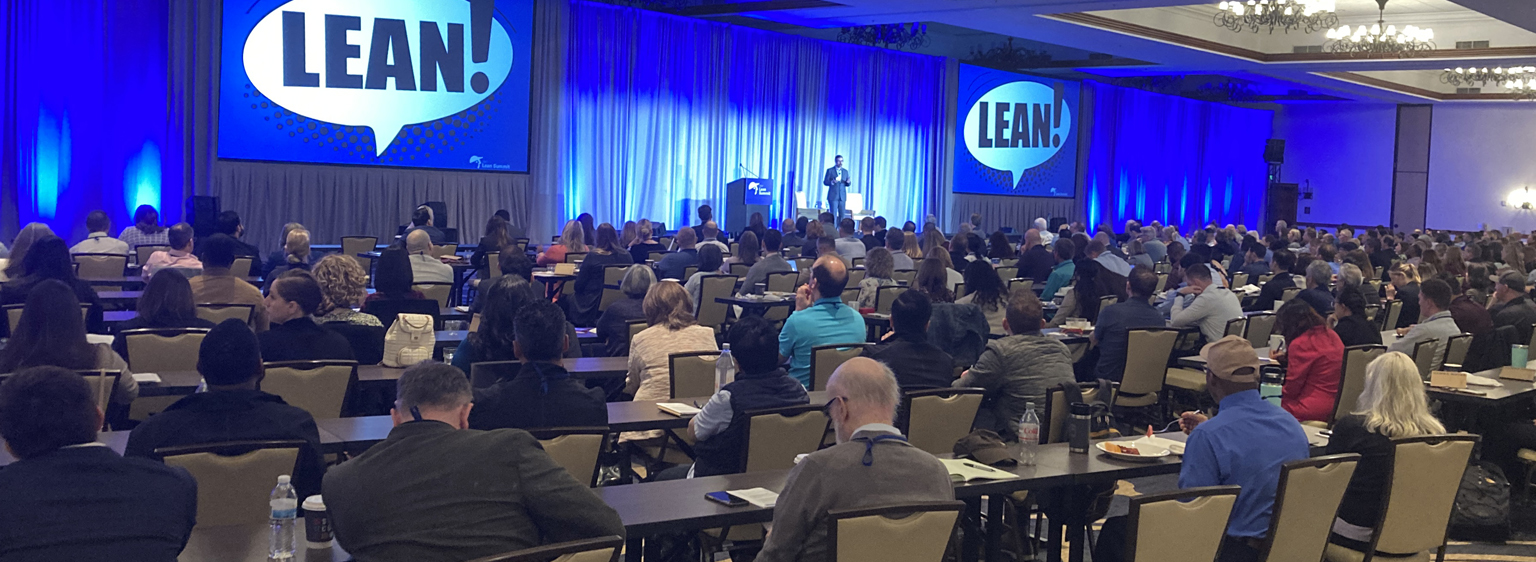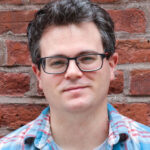LEI hosted its annual Lean Summit March 18-19 in Carlsbad, CA, bringing together over 500 attendees representing industries from healthcare to manufacturing to construction. Under the theme “Shaping Tomorrow, Developing People,” the Lean Summit offered a platform for business leaders to share inspirational stories of transformation and opportunities for lean practitioners to connect. Below is a summary of our keynote speakers, who offered countless insights into how to successfully go about lean transformation and how lean can address today’s most significant challenges, from leveraging AI to reindustrializing the US economy.
Josh Howell
President, Lean Enterprise Institute
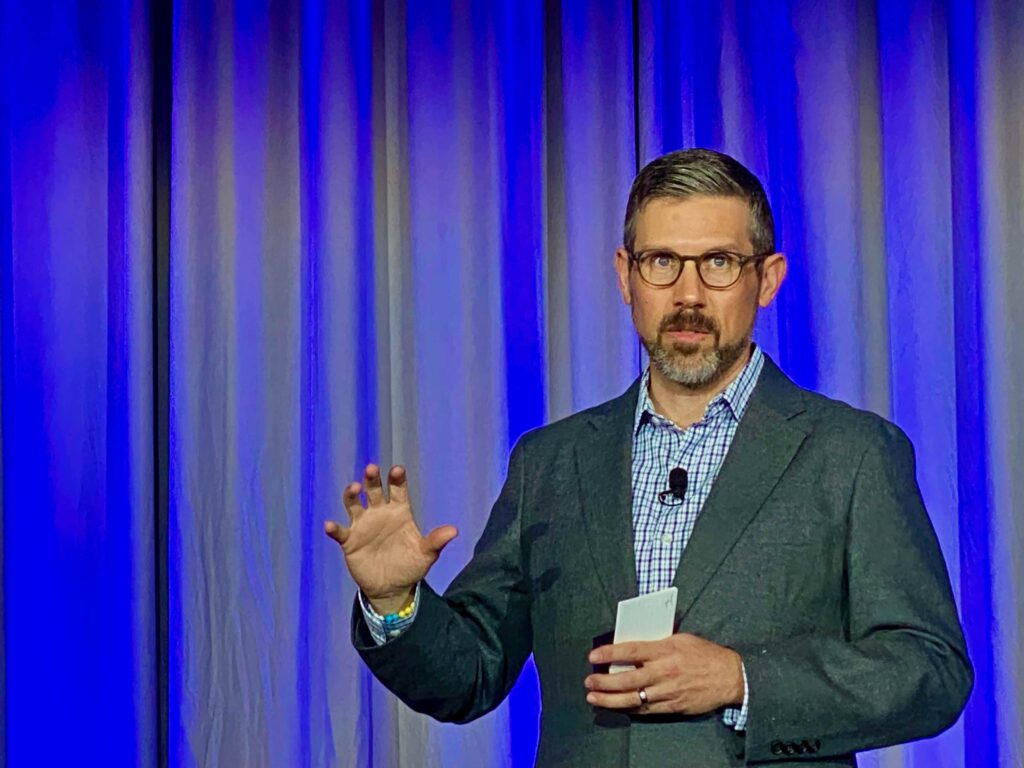
Josh Howell kicked off the Lean Summit with a thoughtful exploration of lean principles, aiming to move beyond the jargon that can cloud their purpose. He encouraged the audience to forget about terms like “hoshin,” “A3”, and even “lean” itself to focus instead on the tenets behind them: problem-solving, respect for people, and continuous improvement.
Lean is performance-driven yet people-centric. It’s technical and social. Lean enables flawless execution yet facilitates learning through failure.
Josh Howell on lean’s paradoxical nature
Mike Conroy
CEO, Sutter Medical Group
John Toussaint, MD
Executive Chairman and CEO, Catalysis
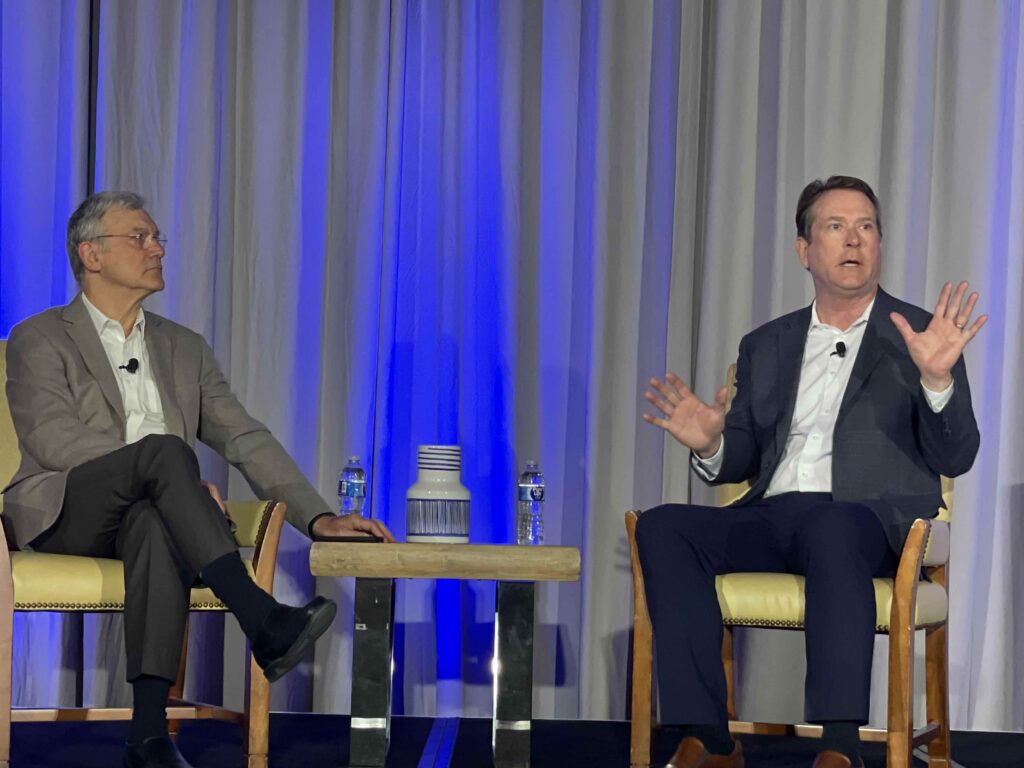
Dr. John Toussaint sat down with Mike Conroy to discuss the challenges of embedding lean principles in healthcare leadership. Echoing Josh Howell’s message, Mike emphasized moving beyond lean as mere terminology, focusing instead on the behaviors and mindsets that underpin its values. John and Mike emphasized leadership’s role in creating a feedback-rich environment where curiosity, humility, and perseverance thrive. They argued for a balanced approach to measuring success that equally values behavioral change and operational outcomes, proposing the measurement of Key Behavioral Indicators alongside Key Performance Indicators. The conversation underlined the shift from directive leadership to one that questions, facilitates, and continuously reflects, aiming to cultivate a deep-rooted problem-solving culture in healthcare.
The question is always, ‘What problem am I trying to solve?’ My personal A3 is about what values we have as an organization and what personal values I have as a leader. Then, what does that mean in terms of what I need to do differently?
Mike Conroy on how he uses an A3 for personal development as a leader.
Paulo Couto
Senior Vice President – Industrialization and Quality, TechnipFMC
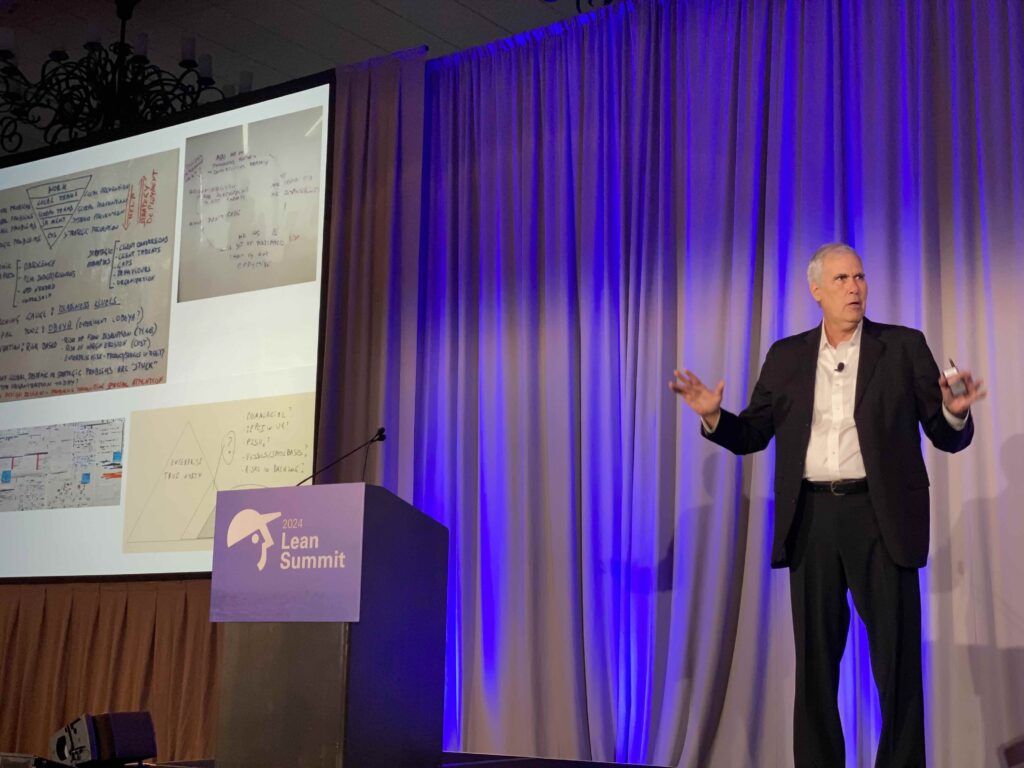
Paulo Couto shared an inspiring transformation story about revolutionizing the company’s product development process to thrive amid the cyclic challenges of the oil and gas industry. By transitioning from an engineer-to-order model to a configure-to-order one, TechnipFMC achieved dramatic cost and lead time reductions for its signature product, propelling it to enormous success. Paulo shared critical lessons behind their transformation, including a “Little Book of Big Rules,” featuring pithy lessons that quickly teach employees lean behaviors. He further shared how the company is applying lessons learned in design to transform the entire enterprise, covering functions from supply chain to finance to human resources.
Every company is in a crisis. And if you don’t think you’re in a crisis, you just don’t know it. You need to reveal it.
Paulo Couto on the importance of crisis in generating urgency for change and leadership’s role.
Fabrice Bernhard
Cofounder and CTO, Theodo
Cofounder and CTO of the global software group Theodo Fabrice Bernhard shared how lean solved the problem of scaling agile, allowing the company to maintain the speed and customer-first mindset of small teams amid rapid growth while avoiding the bureaucracy that often arises in large enterprises. He also shared how structuring organizations into empowered teams versus rigid hierarchies is critical to scaling—and technology’s role in enabling distributed teams to collaborate effectively across large networks.
Miles Arnone
CEO, Re:Build Manufacturing
Miles Arnone shared an inspirational story of how the company aims to revitalize American manufacturing and why it’s vital to the country’s future. Miles traced the history of industrial decline in the US and its economic fallout from the loss of high-wage jobs to the transfer of know-how to global competitors. He shared Re:Build’s vision centered on a sustainable, people-centric approach to industrial growth, contrasting short-term, profit-driven strategies with the long-term value of investing in communities and workforce development. Miles explained how lean is at the organization’s core, demonstrated by its commitment to employee development and leadership’s involvement in continuous improvement.
Lean allows everybody in the company to contribute, which is much more powerful than a grand figure who dictates how things should or shouldn’t be done.
Miles Arnone on the value of lean compared to reliance on a single leader.
John Toussaint, MD
Executive Chairman and CEO, Catalysis
Jackie Gerhart, MD
Physician and VP Clinical Informatics, Epic Systems
Chris Longhurst, MD
Chief Medical Officer and Chief Digital Officer, UC San Diego Health
Lucas Zier, MD, MS
Associate Professor, Zuckerberg San Francisco General Hospital and UC San Francisco
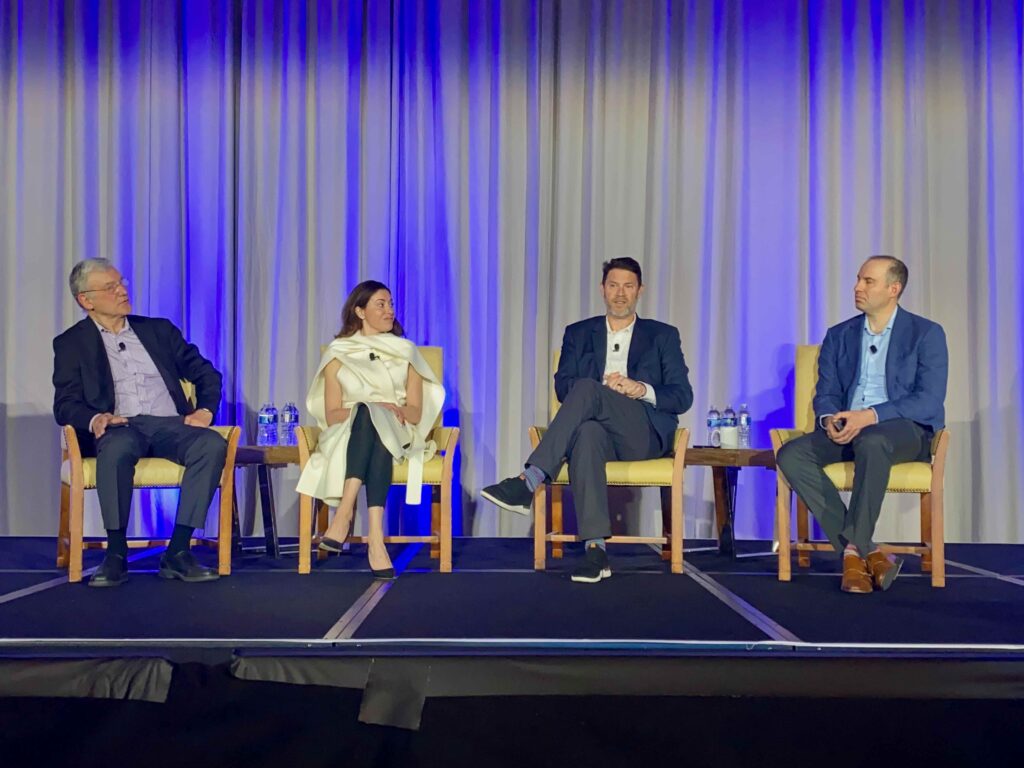
This panel of distinguished healthcare leaders discussed revolutionary integrations of AI within patient care while cautioning that health systems will realize AI’s promise only with the dedicated application of lean processes alongside it. The panel shared how the technology is already improving care, from detecting sepsis to reducing the cognitive burden on doctors and nurses, allowing them to reconnect with their patients. However, they estimated at least 80% of the impact stems from workflow improvements versus the technology. The panel left little doubt that AI will significantly improve healthcare, but it is far from a cure for all the industry’s ills.
AI is the next big thing. But it’s only 20% of the next big thing. We’ve got to fix the workflow.
Dr. John Toussaint cautions that while AI has tremendous promise in healthcare, successful implementation depends on good processes.
Jim Womack
Founder, Lean Enterprise Institute
John Krafcik
Former CEO, Waymo
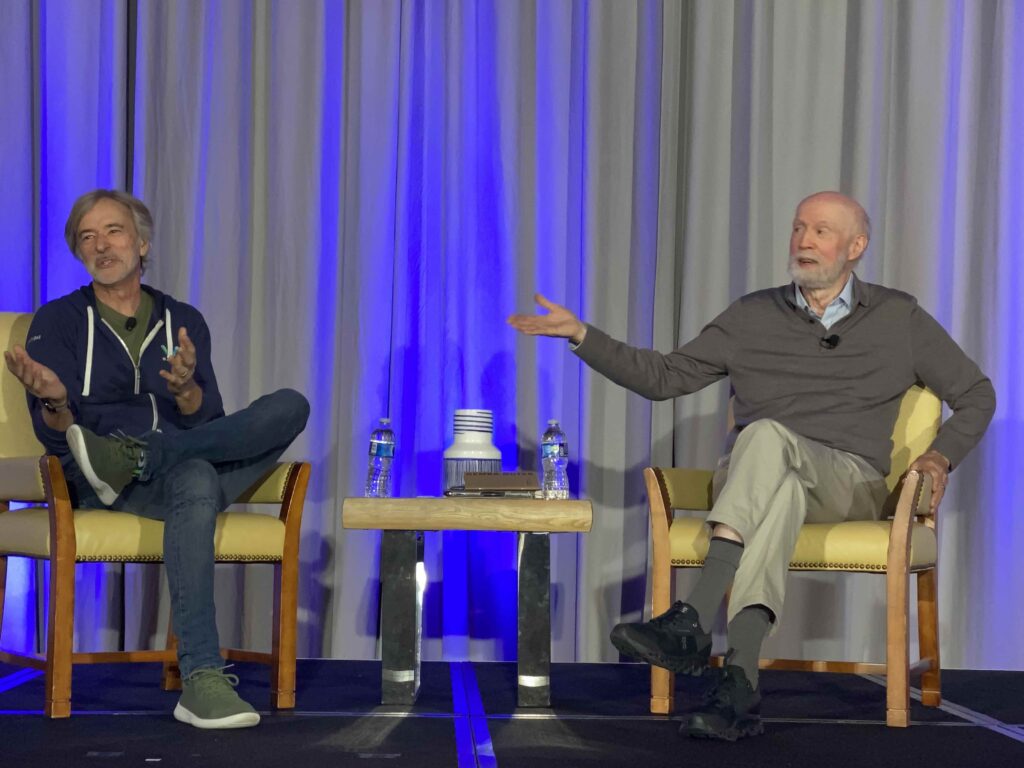
Jim Womack and John Krafcik reflected on the early days of lean thinking, starting with their research at MIT that culminated in the seminal book The Machine that Changed the World and coined the term “lean.”
John offered the audience a glimpse into the future, sharing that Waymo, Google’s autonomous vehicle company, had achieved Level 4 autonomy, whereby a car may operate entirely unsupervised by a human. The next stage toward a driverless future is expanding Waymo’s robotaxis to more metro areas.
We had a long argument about what to call [lean]. We didn’t want to use Japanese terms and we didn’t want to use anything too fancy. So, we decided to name it for what it does—less effort, less inventory, less space, less warranty, fewer defects.
Jim Womack on how his MIT research term coined the term lean following their global benchmark study of the auto industry.
Frank Paluch
Retired President, Honda R&D Americas
Lara Harrington
Retired Chief Engineer, Honda
Frank Paluch and Lara Harrington shared insights on lean product and process development using the case study of the Honda Passport. As the product’s chief engineer, Lara explained how her relentless focus on the customer and rapid experimentation to prove hypotheses transformed the product’s original vision from a large “Suburban fighter” to the sporty midsize SUV on the road today. Frank and Lara discussed the chief engineer’s role, particularly organizing a value stream—from engineering to operations—to achieve a product’s vision. And they explained Honda’s systematic method of developing chief engineers. They closed by reflecting on the auto industry’s future, offering adaptability as the key attribute in navigating the industry’s enormous change.
Adrienne Trimble
VP and Chief Diversity Officer, Sysco
Toshiyuki Kitamura
Project General Manager, Toyota Production System Support Center
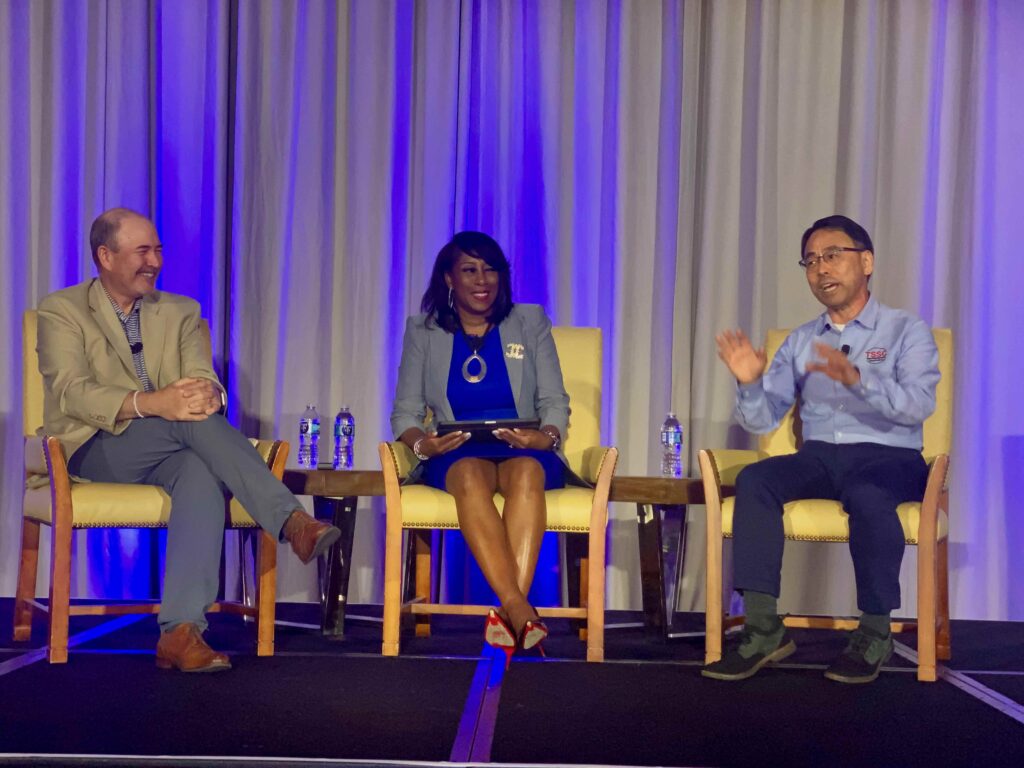
In a panel moderated by LEI board member Scott Heydon, Toshiyuki Kitamura and Adrienne Trimble shared insights on adapting workforce development to generational shifts and technological advancements. Toshiyuki underscored the value of customized, intentional development, reflecting on his experience learning under Toyota mentors at the gemba. Adrienne highlighted the necessity of modifying leadership approaches to resonate with Gen Z, emphasizing the importance of empathy, trust, and understanding individual motivations.
Looking Ahead
LEI will post these keynote presentations to the Lean Post in the coming weeks. We invite you to attend the 2025 Lean Summit in Atlanta on March 5-6, 2025. Learn more by clicking here.
